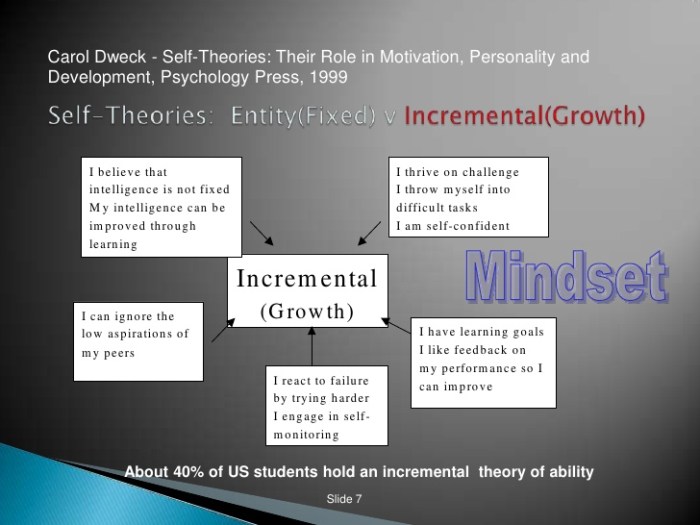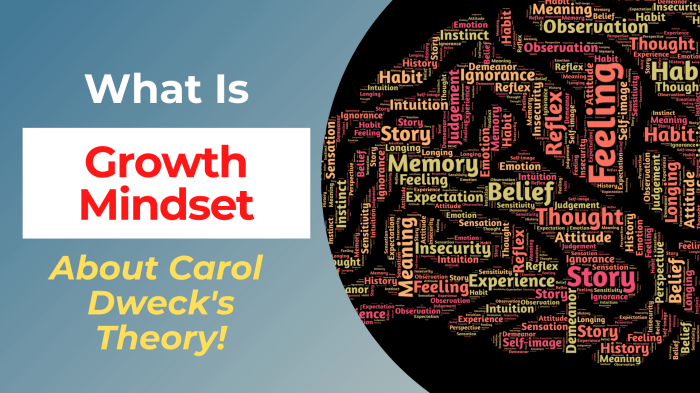An important component to Carol Dweck’s theory of motivation is the concept of effort. Dweck’s research has shown that people with a growth mindset believe that their intelligence can be developed through effort and hard work, while those with a fixed mindset believe that their intelligence is fixed and cannot be changed.
This distinction has important implications for motivation, as people with a growth mindset are more likely to persist in the face of challenges and setbacks, while those with a fixed mindset are more likely to give up.
In this article, we will explore the importance of effort in Dweck’s theory of motivation and discuss how it can be fostered in the classroom and other settings.
Understanding Carol Dweck’s Theory of Motivation: An Important Component To Carol Dweck’s Theory Of Motivation Is

Carol Dweck’s theory of motivation proposes that individuals have either a fixed or a growth mindset. Those with a fixed mindset believe their intelligence and abilities are fixed traits, while those with a growth mindset believe these attributes can be developed through effort and challenges.
The Role of Effort and Challenges, An important component to carol dweck’s theory of motivation is
Effort and challenges play a crucial role in developing a growth mindset. Individuals who embrace challenges and view effort as a path to improvement are more likely to develop a growth mindset. Conversely, those who avoid challenges and believe effort is futile are more likely to adopt a fixed mindset.
Identifying the Importance of Effort

Research studies have demonstrated the importance of effort in motivation. For example, a study by Dweck and her colleagues found that students who were praised for their effort showed greater persistence and resilience in the face of challenges.
Effort leads to increased persistence and resilience because it fosters a belief that improvement is possible. When individuals believe they can improve, they are more likely to persevere in the face of setbacks and strive for excellence.
Fostering a Growth Mindset in the Classroom

Creating a classroom environment that encourages a growth mindset involves several strategies:
- Providing opportunities for students to engage in challenging tasks
- Praising students for their effort and progress, rather than their intelligence
- Encouraging students to learn from their mistakes and setbacks
- Setting high expectations and providing support to help students achieve them
Teachers play a critical role in promoting a growth mindset among students by creating a positive and supportive learning environment.
Applications in Different Settings

The principles of Dweck’s theory can be applied in various settings beyond the classroom:
- Sports:Athletes with a growth mindset are more likely to embrace challenges and persevere in the face of adversity.
- Business:Employees with a growth mindset are more likely to seek feedback, learn from mistakes, and adapt to changing circumstances.
- Personal development:Individuals with a growth mindset are more likely to set challenging goals, take risks, and pursue lifelong learning.
Overcoming Obstacles and Challenges
Common obstacles that can hinder the development of a growth mindset include:
- Negative feedback
- Fear of failure
- Self-limiting beliefs
- Lack of support
To overcome these obstacles, individuals need to:
- Challenge negative thoughts
- Embrace challenges as opportunities for growth
- Seek support from others
- Focus on progress rather than perfection
Implications for Educational Practice
Dweck’s theory has significant implications for educational practice. By understanding the principles of a growth mindset, teachers can create learning environments that:
- Encourage students to embrace challenges
- Value effort and progress
- Promote resilience and persistence
- Foster a love of learning
Teachers can use Dweck’s theory to improve student motivation and learning outcomes by creating a positive and supportive classroom culture.
Essential FAQs
What is Carol Dweck’s theory of motivation?
Carol Dweck’s theory of motivation is based on the idea that people have either a growth mindset or a fixed mindset. People with a growth mindset believe that their intelligence can be developed through effort and hard work, while those with a fixed mindset believe that their intelligence is fixed and cannot be changed.
What is the importance of effort in Dweck’s theory of motivation?
Effort is a key component of Dweck’s theory of motivation because it is the belief that intelligence can be developed through effort and hard work. This belief leads people to persist in the face of challenges and setbacks, and to ultimately achieve greater success.
How can effort be fostered in the classroom?
Effort can be fostered in the classroom by creating a growth mindset environment. This means providing students with opportunities to learn from their mistakes, and to see that their intelligence can be developed through effort and hard work.